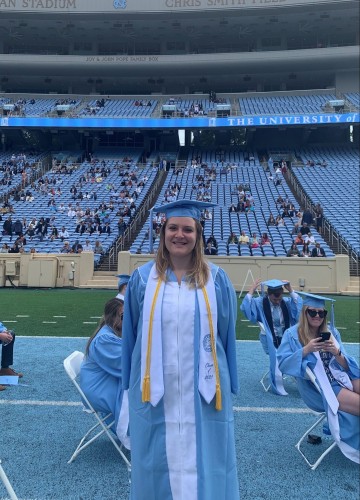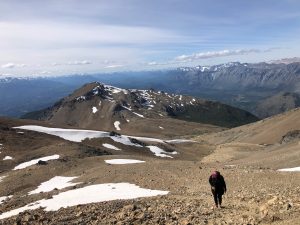Student Spotlight: Katie Kenlan
Katie Kenlan of Pittsboro, NC graduated from UNC-Chapel Hill in May 2021 with a B.A. in Latin American Studies and minors in Anthropology and African American and Diaspora Studies. She began her UNC-Chapel Hill journey at the William and Ida Friday Center for Continuing Education as a part-time degree-seeking student with a passion for learning about other people and cultures.

Katie Kenlan of Pittsboro, NC graduated from UNC-Chapel Hill in May 2021 with a B.A. in Latin American Studies and minors in Anthropology and African American and Diaspora Studies. She began her UNC-Chapel Hill journey at the William and Ida Friday Center for Continuing Education as a part-time degree-seeking student with a passion for learning about other people and cultures. Katie was awarded the 2021 Gil Award for the Best Undergraduate Honors Thesis written on a Latin American or Caribbean topic for her thesis, Why the Latin American Education Model Ecopedagogy is Uniquely Situated to Address Shortfalls Within Environmental Education. She hopes her success story inspires others to explore nontraditional pathways in higher education.
Q: What drew you to this course of study?
A: In high school I had a Spanish teacher from the United States who was married to someone from Spain. I got to know them, and it was inspiring to know someone whose language background was English and had incorporated another culture into their life. I also grew up in Chatham County at the time of almost overnight immigration of Spanish speakers to the area. I was surrounded by the language in my hometown and enjoyed learning about other countries and people’s lives.
The Latin American Studies (LTAM) major at UNC-Chapel Hill is interdisciplinary with only one required core course so it was a good fit for me as a transfer student who had tried a lot of different areas. My first college experience out of high school was a liberal arts school with a creative structure to classes and curriculum so joining the LTAM department allowed me to build upon the foundation I had. I was drawn to the Anthropology department and African American and Diaspora studies (AAAD) department, and that worked well with this major.
Q: Can you tell us a little about your thesis? How have your intellectual interests within Latin American studies evolved?
A: My thesis was titled Why the Latin American Education Model Ecopedagogy is Uniquely Situated to Address Shortfalls Within Environmental Education. Ecopedagogy was developed in Brazil and is an educational framework that bridges the politics of the academy with grassroots political organizing capable of achieving social and ecological transformation. It is a movement directly influenced by the work of Paulo Freire and indirectly influenced by Latin American networks for popular education and liberation theology. My research was designed to broaden the impact of environmental education and encourage deeper reflection on how to instill environmental values and connection to nature in children and adults. Latin America is a leader in environmental education and ecopedagogy incorporates the awareness of oppressive systems in its educational approach not used in western environmental studies practices. It is not the differences between environmental education and ecopedagogy that make them effective but rather the implementation methods of the teacher and their awareness of effective teaching. This pedagogy is the only internationally used approach to sustainable development and environmental education that was not founded in a Western Country. Most policy and frameworks are developed by the countries causing environmental destruction. I looked at three studies, the first, a comparison study of teachers from three different countries, the United States, Argentina, and Brazil, who use ecopedagogy principles; the second a study of a North Carolina forestry middle school supplementary environmental education program; and the third an examination of the effects of a required senior research project at Escuela Verde, an ecopedagogy based charter school in Wisconsin. For this research, I was awarded the Federico Gil Award for the Best Undergraduate Honors Thesis written on a Latin American or Caribbean topic research.
Q: What was it like studying abroad in Argentina? You mentioned that you were on one of the last flights out of the country at the beginning of the COVID-19 pandemic. How did that impact the trajectory of your studies?
A: During 2019-2020 I spent two semesters at the University of Buenos Aires and la Fundación Universidad del Cine in Argentina. I like the different perspectives on the academic material and approach to learning the experience gave me. Studying abroad inspired me to want to go to graduate school in a Latin American Country.
While study abroad is exciting and enjoyable, part of what it did for me was teach me about how to navigate cultural change in my environment. There are a lot of new stressors and tension to deal with daily. The longer you live abroad the more they add up. I studied in Argentina for 7 months. Knowing how to manage these changes and take care of yourself gives you a greater understanding for those in your home country that may be dealing with these differences and emotions. It also better prepares you if you plan to have a job that takes you international.
The pandemic hit during the first week of my second semester of studying abroad. I was one of the last flights out of the country and was in the Panama airport as it was shutting down. Luckily, I decided to fly into Florida first to stay with a friend. Miami was one of the only flights out of South America to not be cancelled. I watched people trying to get to other parts of the United States being rerouted into multiple countries to get home. I ended up renting a car and driving from Florida to NC to complete the last part of my journey.
My program was switched to an online format and all students had to return to the United States to complete the program through Zoom. It was sad leaving my amazing host family in Buenos Aires and knowing I would not get to be in Argentina. However, because I already had one semester and a summer of traveling in Argentina, I had become fluent enough that it allowed me to continue with a lot of Spanish immersion back at home. I felt excited and proud that I could easily switch between Spanish and English without as much effort as when I first arrived in Argentina. Funnily enough, due of the isolation of the pandemic I had less exposure to English. I sometimes felt I was still in Argentina, and I would accidentally start to talk to people in Spanish the first 2 months of being back.
I completed both semesters of study abroad and gained all the credits I would have if I had been in Argentina for both semesters. I learned a lot about Argentina and the places I wanted to visit my second semester. I missed out on some of those experiences, but we all have had to adjust to things not going as planned over the past year. I feel thankful I have stayed healthy and could keep studying.
Q: What has been the most meaningful experience you have had at — or related to — the Friday Center for Continuing Education?
A: The most meaningful experience I had was when I was first trying to get the courage to go back to college. I had been out of school for over 7 years and wanted to apply as a part-time degree-seeking student. I had dabbled at the Friday Center doing non-degree seeking courses. It felt like a big step to ask acceptance through the degree-seeking process. I spoke with a Friday Center advisor named Jennifer, and she helped make me feel that I was good enough and spoke to me as though I was already accepted. This was important to me at the time because the fear of applying almost stopped me several times. Having someone respect me and make the process welcoming, encouraging, and positive was everything I needed. It can be hard to be out of school for a long time. It is also intimidating to apply to an internationally renowned institution and one of the best schools in our country. The Friday Center helped make sure I was prepared and was my home base for many years while I was at UNC-Chapel Hill.
Q: Friday Center students tend to have nontraditional pathways to their degree. Is there anything you would like to share about your journey and/or how you overcame any obstacles?
A: There are many people in our lives who have not taken a traditional path to college. It helped me to be reminded of those around me and people I admired who did not go the traditional path. I had two good friends that were going back to school who were also in this nontraditional category. It helped me to have them as resources and role models. Many people do this, and you can do it too!
One of the obstacles I did not initially realize I had was an undiagnosed learning disability. That was one of the things I learned about while out of college through receiving weekly therapy. This encouraged me to get tested and come back to college with all the knowledge and tools I needed to be more successful than before.
I enjoyed college more as an older student, and I am thankful for the experiences I had before returning. Students in my classes were excited to work with me and enjoyed including someone outside of their peer groups. It can be a breath of fresh air for students to not be bogged down by social dynamics and some of the contrived perceptions they have of success and the right way you are supposed to go through life. UNC-Chapel Hill is full of amazing students and opportunities. I hope if someone is reading this and hoping to return to college, they will be brave and go for it. The Friday Center at UNC-Chapel Hill is a great way to return to college.
Q: What are your hopes for post-graduation?
A: I plan to continue directing the youth outdoor program I designed, the Carolina Creek Club. I will be working with local families running weekly camps in an outdoor nature preserve. I plan to expand this program to reach a more diverse socioeconomic group of kids by turning it into a non-profit that will allow for more tuition funding to make it affordable for more families. In the coming year I will be offering afterschool programs in Chatham and Alamance County. I plan to continue building upon my interest and passion for children’s development and the development of environmentally conscious adults. I also plan to go to graduate school to study child psychology.
CATEGORIES Academics | Homepage News | Student Spotlights

